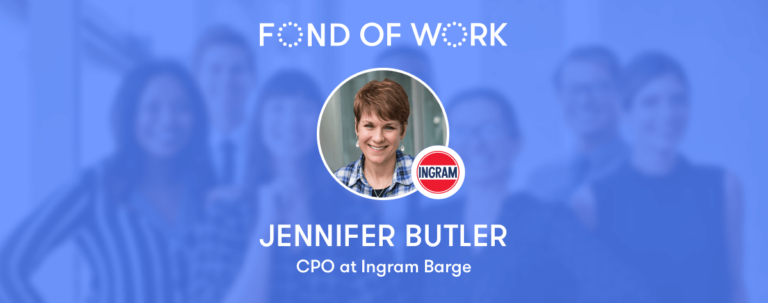
This time for Fond of Work, we spoke with Jennifer Butler, SVP and Chief People Officer at Ingram Barge. Jennifer is a strategic executive with extensive experience in human resources and talent management. She has worked at Ingram Barge Company since 2018, where she is responsible for defining, developing, organizing, and directing the Human Resources functions. Jennifer manages employment, training, organizational development, compensation, employee relations, and communications. She previously served as VP, Human Capital Management for Eco-Energy, an alternative energy company based in Franklin, Tennessee.

How did you first get into the HR space?
I left college with a Masters in Organizational Communication and undergraduate in Industrial Psychology. I started my first job in training at Union Pacific Railroad. I initially wanted to be a high school teacher, and in my senior year changed my degree to Industrial Psychology. I had been fascinated by my psychology teacher who taught how psychology was being used in the business field. At the time, I had all but my student teaching completed for my education degree and everyone I ran into was a former teacher. When I asked them why they quit teaching they would say, “Couldn’t make enough money at it.” I was wondering why I was pursuing something so many people were getting out of so I switched my major.
How did you end up in your current position?
Training led me to work in outside consulting in organization design and change management. Then, consulting led to internal positions in training and development and OD. The senior OD position in a distribution business growing through M&A led to taking on all of HR for a large region. That job led to VPHR position for promotional marketing company and then several startup businesses, including a startup printing business I did with my husband. I then went back to a Senior OD position with a large healthcare company, then VPHR for energy business, and now I’m the CHRO of Ingram Barge.
Why are you fond of your work?
I love helping people achieve their best at work. My super power is assessing talent and helping put it in the right place within an organization. I have very strong business diagnostic skills. It only takes me a few months to get into a new company, assess the needs of the business, and then identify the talent gaps. I have an uncanny ability to spot the weak links or the sacred cows that just don’t fit and need to exit the business quickly. Many times, it’s just about helping everyone deal with their guilt long enough to do the right thing by the person and the company. The interesting thing is the people who are the wrong fit almost always know they need to go and in the end are relieved. It feels great assisting people in finding their best place to contribute. I also feel valued when I can contribute to the growth and success of the company by ensuring it has the right talent at the right time in the right place.
Why do you think HR is an important department for every business to have?
HR is critical because no business has figured out how to run entirely by machine or robot. As long as you have human beings in your business, you will need HR.

Once you understand how a business makes money and what the key initiatives are, you have to align the employees to accomplish those initiatives. HR is strategic for any business because it is responsible for the communication of the vision and strategy, for helping leaders outline the objectives, to prepare measurement systems and provide the performance feedback, and to ensure employees are making progress and achieving the business goals.
HR is also essential to ensure the business has the talent it needs to operate. Without HR, there wouldn’t be any employees to do the work, they wouldn’t have clear messages regarding the purpose of their work or feelings of engagement to the business. We also wouldn’t have reward systems in place to promote and retain employees.
What’s your management philosophy? How do you apply it at your company?
Hire people smarter and better than you and get out of their way. I realize the best thing I can do as a leader is find the most talented people to build my team and then give them clear expectations about the purpose of our mission and the specific objectives we want to accomplish as a team and individually. Then, make sure they have the tools and resources to accomplish their goals and remove as many obstacles as I can for them. The rest is about letting them have the freedom to achieve those goals how they see fit, not how I would have done it (which isn’t always easy.)
 Letting go of those very important projects or ones you have passion for can be difficult. When you have a strong, talented team, it is easier to delegate and get out of the way. I make sure to check in with them regularly, ask them if they have questions, and get updates on how things are going. I want to be close to them and let them know I care, but not be overbearing or micromanaging.
Letting go of those very important projects or ones you have passion for can be difficult. When you have a strong, talented team, it is easier to delegate and get out of the way. I make sure to check in with them regularly, ask them if they have questions, and get updates on how things are going. I want to be close to them and let them know I care, but not be overbearing or micromanaging.
I also let them know that mistakes are how we learn, and I will always have their backs and take full responsibility for anything that goes wrong on our team. I only ask that as soon as they know we have something going awry that they fill me in so I can help. I had a boss that used to say if I know about it we have a problem. If I don’t, you have a problem. That always made sense to me, so I want my people to feel good about coming to me no matter what goes wrong. I try to share my mistakes openly with them so they can see that I mean it. My main goal is for us to be authentic on our team and be able to tell each other the truth.
How do you reward and recognize employees at Ingram Barge?
I’ve done everything from buying them lunch and providing a small token gift to writing about their accomplishments in the company newsletter. I also like to write personal thank-you notes and mail them to their homes.
I am a big fan of personal note writing because that’s something I’ve done all my life. Everyone sends emails and texts and the art of writing a note is lost. My mother was a note writer and I love having special note cards in all kinds of decorations and some with Ingram logos. For different occasions, I handwrite notes and either leave them on their desks or send them to their homes. It’s amazing how much it means to associates when you take the time to actually write a note. I’ve seen some of them keep them in their offices or on their bulletin boards for years.
What is Ingram Barge doing to react to COVID-19?
We, like most companies, sent all our nonessential workers to work remote. We’ve surveyed several times to see how associates are managing at home, to get their thoughts on the pandemic and working at home, and when they think it will be safe to return. We’ve sponsored family focus groups so associates could share ideas on childcare, returning to school, home schooling, caring for elderly, COVID related anxiety, etc.
 We’ve also offered new EAP access for associates struggling with pandemic-related issues. We have a loan program for any associates with extreme hardship. Unfortunately, we did restructure our workforce and laid off 10% back in July including both shoreside and marine associates. We established a COVID task force for determining new safety protocols for all our marine and shore personnel and facilities requiring changes in both how our associates live and work on our vessels and operate at our facilities and partnered with our medical director to establish COVID testing.
We’ve also offered new EAP access for associates struggling with pandemic-related issues. We have a loan program for any associates with extreme hardship. Unfortunately, we did restructure our workforce and laid off 10% back in July including both shoreside and marine associates. We established a COVID task force for determining new safety protocols for all our marine and shore personnel and facilities requiring changes in both how our associates live and work on our vessels and operate at our facilities and partnered with our medical director to establish COVID testing.
How has COVID-19 affected the way you reward and recognize your employees?
We have had to cancel all the live events we had for associate anniversary and retirement celebrations. It was a tough decision but, ultimately, the right call.
What’s the best advice you’ve received in your career?
Early in my career, I was starting my first professional training and OD role and I was very excited to be joining a team of other OD professionals at the Union Pacific railroad. I must have come on strong the first couple of days offering a lot of opinions and being a bit overzealous. My lovely boss, who was quite senior to my late twenty something self, asked to see me at the end of my first week on the job. He was such a wonderful professional and coach and in the nicest way possible asked me if I could do him a favor and try not to give the department all the benefit of my knowledge and expertise during the first week.

It was the best velvet hammer of coaching I’ve ever received, and that was over 35 years ago. I’ve thought about him many, many times in my career and what a blessing he gave me that day. If he had not said those few wonderful, kind words, I might have unknowingly alienated that whole staff and potentially ruined the start of a great career. I learned that day to listen more and talk less — not that my opinions weren’t valuable. It’s just that they were a lot more valuable after getting to know the team and the lay of the land. I sounded a lot smarter when I could relate my ideas to the real work of the railroad and what was happening in the training department. I had no idea what they were doing that first week and needed to take the time to find out before blasting my opinions. It was a great lesson, especially for someone so young.
What are some of the most pressing issues HR leaders face today?
First of all: we’re all learning how to attend to the wellbeing of our people with so much uncertainty and unrest in the world. I believe most associates show up to work already exhausted from their personal lives. The pandemic, the economy, the uncertainty of the political landscape and the division it has created in the families and among close friends who’ve been divided on party lines, the racial tensions, social responsibilities — there are so many things facing the average person every day before they even leave the house, and it’s all in their face 24 hours a day due to social media. They never get a break from the stimuli in their lives, and adding work on to the landscape just makes it worse. I believe HR needs to find a way to help associates fight that distraction and mind their wellbeing and stress levels.

The second major challenge is defining the work of the future and making sure that the average person stays ahead of the skills they will need to stay relevant and employed. Statistics show so many of the businesses that will top the S&P five years from now aren’t even viable businesses today. This emphasizes the rate of change like never before, so how will we keep up with that level of change and the growing potential skill gap?
Finally, how will we adjust to the new normal and when will that “new normal” be established. Will we ever be communicating in an open room again, or will it always be via a Zoom call? Will we all have to get used to communicating with a mask for the foreseeable future?
What’s one thing you’ve had to learn the hard way in your career?
That I have to get over the imposter syndrome and use my voice. It took me too long in my career to realize and leverage the talent, skills, and capacity I have and to ask for the rewards that I am worth. Because I’m on the tail end of the Baby Boomer generation, I am used to sitting back and waiting for permission and not asking for a reward. I let others dictate my career and what role would be next. I now am better at asking for the role I want, understanding my value, knowing my worth, and putting it out there — whether I’m volunteering for a project team, giving my opinion in a meeting, or going to the CEO with a recommendation. Getting comfortable in my own skin took longer than it should have.
Any advice for future HR leaders?
Don’t wait so long to assert yourself or to become perfect. Be prepared, know what you know and more importantly what you don’t and get started. Don’t wait to be invited to the table, raise your hand, be prepared, have your facts, and make a difference. Be a business leader first, then bring your HR expertise! That way, you will always be strategic and focused on the right things.
Thanks so much to Jennifer for taking the time to speak with us. Stay tuned for the next interview in the Fond of Work series, coming soon!
Fond is a global SaaS platform that seamlessly consolidates employee rewards and recognition processes into one easy-to-use solution. For more information on how Fond can help you, request a demo today!
